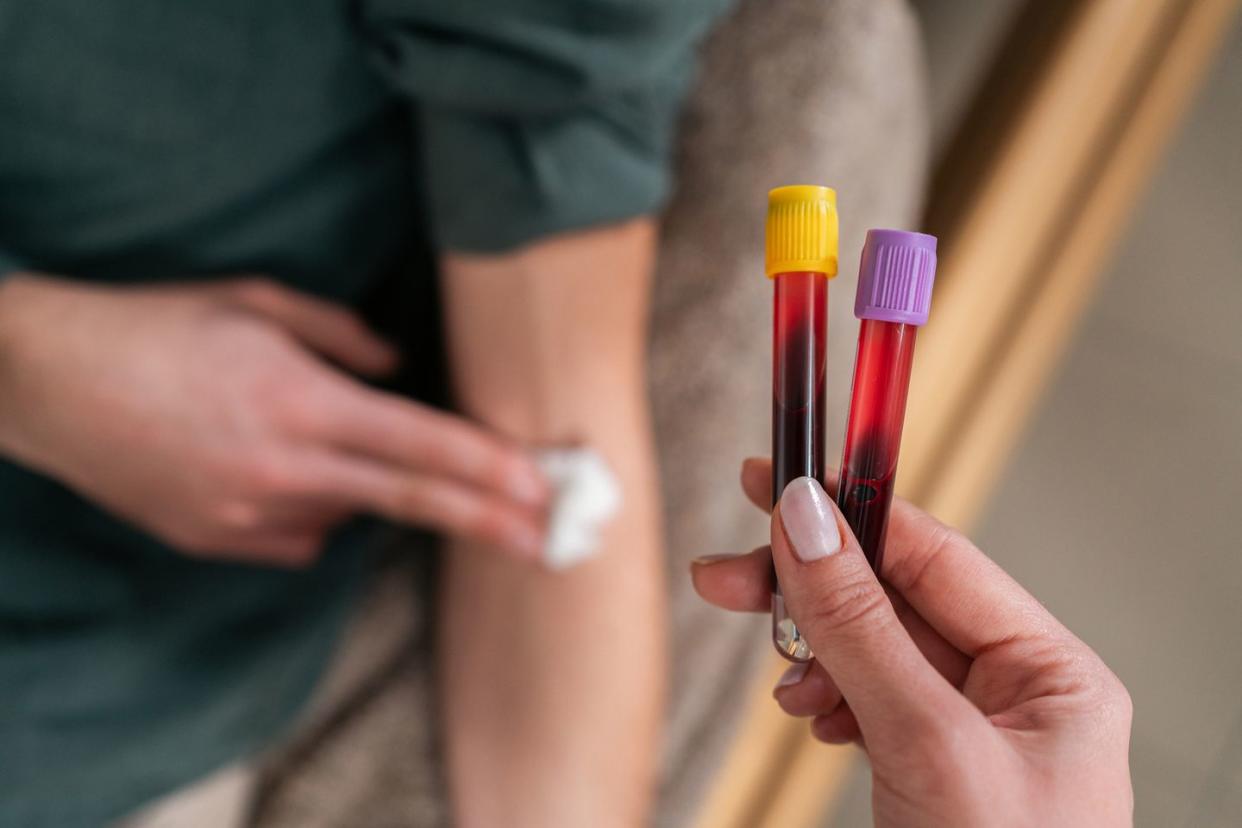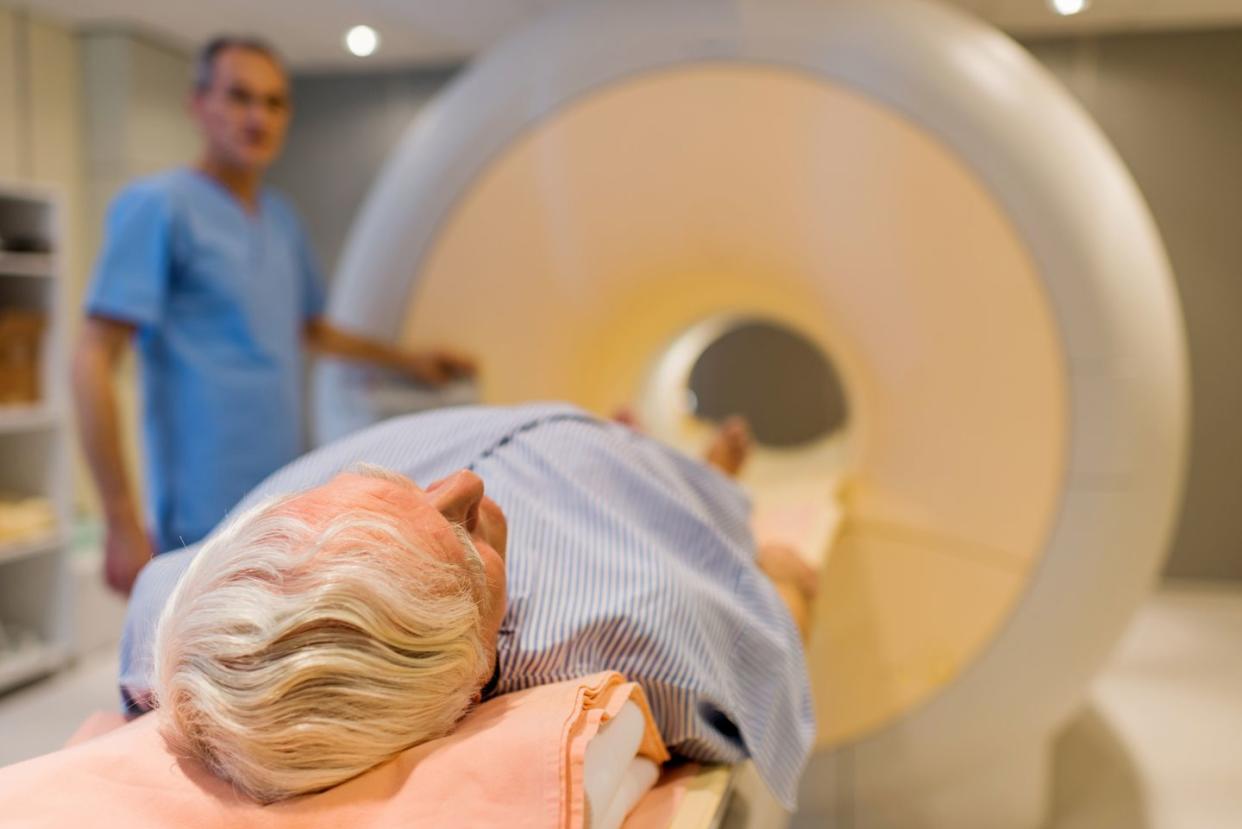Doctors Explain What Prostate Cancer Screenings Involve

"Hearst Magazines and Yahoo may earn commission or revenue on some items through these links."
IF YOU’VE NEVER had a prostate cancer screening, you may worry that it will be embarrassing and uncomfortable. Doctors say that’s not the case, however. The tests are quick and essential for early detection of the disease.
“It’s a very simple process,” says Paul Gittens, M.D., a board-certified urologist and founder of Rockwell Centers for Sexual Medicine and Wellness in Pennsylvania and New York City. “I think a lot of guys are anxious because they’re nervous that the results may indicate they have prostate cancer.” They're also nervous about the infamous DRE (digital rectal exam), which docs say doesn't always have to be part of the test.
No matter how matter how worried you are about the test itself or the results, getting screened for prostate cancer is vital. “It's something that you really want to detect early, and with early detection, treatment would be administered earlier, and survival should be at a higher rate,” Dr. Gittens says.
Prostate cancer is the second most common cause of cancer death among men, according to the American Cancer Society. This year, the organization projects that about 300,000 new cases will be diagnosed, and 35,250 men will die from the disease. Black men are about 70 percent more likely to get prostate cancer.
Often, getting screened just involves a simple blood test, and there’s not really anything you need to do to prepare, explains Felix Feng, M.D., a radiation oncologist at the University of California San Francisco and co-founder of ArteraAI.
Finding the disease in its early stages means it’s typically easier to treat, he says. “Treatment for earlier-stage disease can be less intensive and have fewer side effects than treatment for later-stage disease.”
Here’s what to expect when you schedule a prostate cancer screening:
When Should You Get Screened?
“It depends on the risk factors that a gentleman might have,” Dr. Gittens says.
The American Urological Association recommends most guys start getting screened for prostate cancer between ages 45 and 50.
But men who are at a higher risk for the cancer should get screened beginning at age 40. These groups include Black men, people with a family history of the disease, and individuals with certain gene mutations, such as the BRCA gene.
It’s best to see your primary care doctor, who typically conducts the testing and then recommends you to a specialist if needed, Dr. Feng says.
What Prostate Cancer Screening Involves
Prostate cancer screening typically involves a blood test to detect levels of prostate-specific antigen (PSA). Dr. Gittens says it’s a straightforward blood test.

PSA is a protein that’s produced by prostate tissue, according to the Mayo Clinic. The test can detect high levels of PSA, which might signal prostate cancer. High PSA could also suggest other conditions, like an enlarged prostate.
The PSA test is often paired with a digital rectal exam (DRE), where a doctor inserts their finger into the rectum to feel the prostate gland. “We look for any bumps or lumps or any signs of abnormality,” Dr. Gittens adds.
“A lot of guys are hesitant of the rectal exam,” he says, so if it’s causing too much angst, doctors can sometimes skip it and just do a PSA, especially if it’s your first screening.
A DRE alone isn’t as effective as the PSA for detecting prostate cancer, Dr. Feng says. “However, it can sometimes identify cancers in men who have normal PSA levels.”
So, many doctors prefer to do both tests, Dr. Gittens adds.
How to Prepare for a Prostate Cancer Screening
A PSA is like any routine blood test, Dr. Feng says. But you should refrain from ejaculating for at least 48 hours before the exam. This could temporarily raise your PSA levels, which might trigger a false positive.
Also, avoid exercising before the test, which might affect PSA levels. If you have any signs of an infection, such as having to pee frequently or blood in your urine, Dr. Gittens says it’s best to treat the infection before getting a PSA test.
The DRE doesn’t require any preparation. But you should talk to your doctor if you’re worried about it, Dr. Feng says.
What About At-Home Tests?
A number of at-home PSA tests are available. While Dr. Feng says they can be convenient, it’s best to get tested at your doctor’s office.
“Test results should be discussed with your doctor,” who can recommend the next steps based on the result, he explains.
It’s also just a good idea to establish a relationship with a physician, Dr. Gittens adds. Doctors can recommend other necessary health screenings, like colonoscopies, and routinely check your blood pressure and cholesterol.
What Happens After Screening?
If your PSA levels are high, your doctor will likely refer you to a urologist.
Dr. Gittens says he typically asks patients if they had sex before the PSA test or noticed any blood in their urine or feel like they need to run to the restroom frequently. Then, he usually repeats the PSA test and performs a DRE.
If the result still shows an elevated PSA, it’s recommended that guys get an MRI or biopsy of the prostate, depending on the individual and their doctor’s recommendations, Dr. Gittens says.

“I favor the MRI, just to pick up any aggressive lesions,” he explains. “Then if there is an aggressive lesion, you can just biopsy that area.”
A biopsy involves inserting a needle into the prostate to collect tissue samples to examine for signs of cancer, Dr. Feng says. The procedure takes about 10 minutes.
If a biopsy shows that someone has cancer, doctors determine a patient’s next steps.
“There’s some prostate cancer that’s really low grade, and we’ll just watch it and no treatment is needed,” Dr. Gittens says.
Patients with higher-grade cancer may need treatments, such as radiation therapy, surgery, chemotherapy, immunotherapy, or other therapies.
When to Get Re-Screened
If you’re in a low-risk group and your initial screening is normal, you should get a PSA every two to four years, Dr. Gittens says.
But Black men and guys with a family history or genetic mutations for prostate cancer should be screened every one to two years, regardless of whether their previous PSA was normal, he emphasizes.
Regular screening and early detection ensure you get the treatment you need as soon as possible, which increases your cancer survival rate, Dr. Gittens says. “It’s always harder to treat cancers when they’re more advanced and more aggressive.”
You Might Also Like
